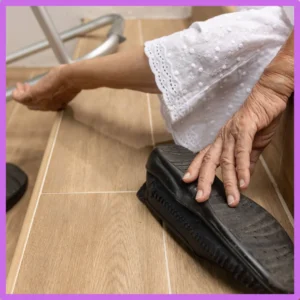The Dangers of Untreated Hearing Loss
Hearing loss often sneaks up on people, gradually diminishing their ability to communicate without them realizing the full impact. While hearing loss itself might not seem life-threatening, ignoring it can lead to serious health issues that affect both your mind and body. Untreated hearing loss doesn’t just impair your ability to hear—it can significantly reduce your quality of life and put your overall health at risk.
Cognitive Decline and Hearing Loss
Research shows that untreated hearing loss can lead to cognitive decline over time. Studies, including a prominent one from Johns Hopkins, have revealed that older adults with hearing loss are at a much higher risk of developing dementia. The study followed 639 adults over a decade and found that those with hearing loss had a two to five times greater risk of cognitive decline compared to those with normal hearing.
One reason for this connection may be the strain hearing loss puts on the brain. When you can’t hear well, your brain has to work harder to make sense of sounds, which can cause mental fatigue. Over time, this strain may lead to memory loss, confusion, and even dementia. Another factor is social isolation, which is common for people with hearing loss and can also contribute to cognitive decline.
The good news is that using hearing aids can help. Studies suggest that treating hearing loss with hearing aids can reduce the risk of cognitive decline and help maintain brain function. By improving your ability to hear, hearing aids can lessen the mental load on your brain, allowing it to function more efficiently.
Key Tip: Treating hearing loss early can help protect your brain from unnecessary strain and reduce your risk of dementia.
Depression and Social Isolation
Untreated hearing loss often leads to emotional and mental health issues, including depression and social isolation. Many people with hearing loss find it harder to participate in conversations, especially in noisy environments. This can make socializing difficult and frustrating, causing people to withdraw from social situations. Over time, this isolation can lead to loneliness and depression.
The National Institute on Deafness and Other Communication Disorders (NIDCD) reports that individuals with untreated hearing loss are more than twice as likely to experience depression compared to those without hearing loss. This emotional toll can have a profound effect on your overall well-being, making it harder to enjoy life or stay connected with loved ones.
However, hearing aids can help prevent this downward spiral. By improving your ability to hear and communicate, hearing aids make it easier to engage in conversations and social activities. This can improve your mood, reduce feelings of isolation, and help prevent depression.
Key Tip: Wearing hearing aids can help you stay connected with others, improving your mental health and emotional well-being.

Increased Risk of Falling
Hearing loss doesn’t just affect your mind—it can also put your physical safety at risk. Another study found that even mild hearing loss can triple your chances of falling. When you lose your hearing, you lose some of the spatial awareness that helps you navigate your environment. This makes it easier to trip, stumble, or lose your balance, especially in unfamiliar places or in dim lighting.
Hearing aids can improve your balance and spatial awareness by restoring your ability to hear important environmental sounds, such as footsteps or approaching objects. This heightened awareness can help you move more confidently and avoid accidents.
The connection between hearing and balance is stronger than many people realize, which is why treating hearing loss is so important for maintaining physical health.
Key Tip: Treating your hearing loss with hearing aids can help reduce your risk of falls and improve your overall safety.
Impact on Career and Income
Hearing loss can also impact your professional life. Studies have shown that untreated hearing loss can lead to lower income, fewer career opportunities, and higher unemployment rates. People with hearing loss may struggle in work environments where communication is key, leading to misunderstandings or reduced productivity.
A study from the National Institutes of Health found that people with untreated hearing loss are twice as likely to be unemployed as those who use hearing aids. Even for those who are employed, untreated hearing loss can result in lower earning potential due to missed opportunities for advancement or difficulty performing tasks.
By addressing hearing loss with hearing aids, you can improve your communication skills and boost your confidence in the workplace. Many people find that treating their hearing loss not only improves their personal lives but also enhances their professional success.
Key Tip: Addressing hearing loss with hearing aids can help you thrive in your career and increase your earning potential.
Heart Health and Hearing Loss
Your heart health and hearing health are closely connected. Poor cardiovascular health can reduce blood flow to the inner ear, which is essential for maintaining healthy hearing. When blood flow is restricted, the delicate structures of the inner ear can become damaged, leading to hearing loss.
Research has shown that people with heart disease are more likely to experience hearing loss than those with healthy hearts. This connection highlights the importance of maintaining good cardiovascular health to protect your hearing. By managing your heart health through regular check-ups, a balanced diet, and exercise, you can reduce your risk of hearing loss and improve your overall well-being.
Treating hearing loss can also have a positive impact on your heart health. Some studies suggest that hearing aids can reduce the mental and physical strain associated with hearing loss, leading to improved overall health, including cardiovascular health.
Key Tip: Protecting your heart health can also protect your hearing, making it essential to monitor both.
Other Health Conditions Linked to Hearing Loss
Hearing loss is linked to several other serious health conditions, including diabetes and chronic kidney disease. Studies have shown that people with diabetes are more likely to experience hearing loss due to damage to the blood vessels and nerves in the ear. Similarly, more than half of patients with moderate chronic kidney disease suffer from hearing loss.
Untreated hearing loss has also been associated with increased hospitalizations and emergency room visits. This may be due to the increased risk of accidents and falls, as well as the strain untreated hearing loss places on both the mind and body.
By addressing hearing loss early, you can reduce your risk of developing these other health issues and improve your overall quality of life.
Key Tip: Taking care of your hearing can help reduce the risk of other serious health conditions and keep you healthier in the long term.

Protect Your Health by Addressing Hearing Loss
Untreated hearing loss can affect every aspect of your life, from your mental health and cognitive abilities to your physical safety and career. The good news is that hearing aids can offer significant improvements in your hearing and overall quality of life. By treating your hearing loss early, you can protect your brain, improve your balance, and maintain better emotional well-being.
Take control of your hearing health today. Contact Stanford Hearing in Sioux Falls, Buffalo, or Madison to schedule a hearing evaluation and learn more about how hearing aids can help you. Don’t wait—improve your quality of life and protect your health by addressing your hearing loss now.
